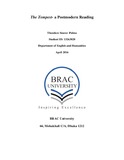| dc.contributor.advisor | Islam, Syed Manzoorul | |
| dc.contributor.author | Palma, Theodore Sourav | |
| dc.date.accessioned | 2017-01-26T10:25:40Z | |
| dc.date.available | 2017-01-26T10:25:40Z | |
| dc.date.copyright | 2016 | |
| dc.date.issued | 2016-04 | |
| dc.identifier.other | ID 13263020 | |
| dc.identifier.uri | http://hdl.handle.net/10361/7680 | |
| dc.description | This thesis is submitted in partial fulfillment of the requirements for the degree of Masters of Arts in English, 2016. | en_US |
| dc.description | Cataloged from PDF version of thesis. | |
| dc.description | Includes bibliographical references (page 38-39). | |
| dc.description.abstract | The works of William Shakespeare have a universal influence and are considered the
representatives of ‘all time and all ages’. Critics, scholars, academics and students have been
rereading, reexamining, retelling and restaging his plays century after century. This dissertation
proposes to examine The Tempest as a postmodern text. The postmodern elements: ant-formality,
pastiche, intertextuality, paranoia, irony, playfulness, puns, wordplays, conspiracy theories,
temporal distortion and supernatural elements create an atmosphere in The Tempest which can be
described as postmodern. Focusing on the Ihab Hassan and Brian McHale’s definition and
characterization of postmodernism which have created an opportunity to have a postmodern
approach to The Tempest, this paper illustrates how Shakespeare deconstructs the formal
properties of the text and uses pastiche that project a postmodern connotation of the play. The
dissertation also explores the religious, mythological, geographical and historical references of
characters and their names, events and incidents, and locations and places that construct
intertextuality and insert paranoia in the play. In identifying postmodernist elements—
particularly the presence of supernatural and dreamy world—this dissertation attempts to
examine binaries natural vs. supernatural and reality vs. dream which are pivotal postmodern
concepts. Based on Foucault’s The Eye of Power, the dissertation also discovers the Panoptical
Gaze of Prospero who has assigned Ariel—as a surveillance to keep an eye on everybody and
everything in the island. Finally, this paper aims at rereading The Tempest—as a postmodern text. | en_US |
| dc.description.statementofresponsibility | Theodore Sourav Palma | |
| dc.format.extent | 39 pages | |
| dc.language.iso | en | en_US |
| dc.publisher | BRAC University | en_US |
| dc.rights | BRAC University thesis are protected by copyright. They may be viewed from this source for any purpose, but reproduction or distribution in any format is prohibited without written permission. | |
| dc.subject | English and humanities | en_US |
| dc.subject | The Tempest | en_US |
| dc.title | The Tempest: a postmodern reading | en_US |
| dc.type | Thesis | en_US |
| dc.contributor.department | Department of English and Humanities, BRAC University | |
| dc.description.degree | M.A. in English | |

